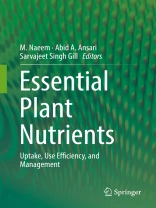This book explores the agricultural, commercial, and ecological future of plants in relation to mineral nutrition. It covers various topics regarding the role and importance of mineral nutrition in plants including essentiality, availability, applications, as well as their management and control strategies. Plants and plant products are increasingly important sources for the production of energy, biofuels, and biopolymers in order to replace the use of fossil fuels. The maximum genetic potential of plants can be realized successfully with a balanced mineral nutrients supply. This book explores efficient nutrient management strategies that tackle the over and under use of nutrients, check different kinds of losses from the system, and improve use efficiency of the plants. Applied and basic aspects of ecophysiology, biochemistry, and biotechnology have been adequately incorporated including pharmaceuticals and nutraceuticals, agronomical, breeding and plant protectionparameters, propagation and nutrients managements. This book will serve not only as an excellent reference material but also as a practical guide for readers, cultivators, students, botanists, entrepreneurs, and farmers.
สารบัญ
Essential Plant Nutrients and Recent Concepts About Their Uptake.- Status and Importance of Nutrients for Plant Growth & Development: Role of Essential and Beneficial Nutrients in Plant Growth and Development.- Nutrient Deficiency: its Impact on Crop Productivity.- Quantitative Attributes of Nutrient Uptake and Use Efficiency.- Biochar as Soil Amendment for Essential Plant Nutrient Uptake.- Nutrient Use Efficiency.- Understanding the Dynamics of Phosphorus Starvation and Plant Growth.- Response Pattern of Selected Tropical Perennials to Organic and Inorganic Fertilizers Based on Empirical Data.- Unraveling the Impact of Essential Mineral Nutrients on Active Constituents of Selected Medicinal and Aromatic Plants.- Actions of Biological Trace Elements in Plant Abiotic Stress Tolerance.- Regulatory Role of Mineral Nutrients and PGRs in Nurturing of Medicinal Legumes Under Salt Stress.- Role of Iron in Alleviating Heavy Metal Stress.- Calcium Applications Enhances Plant Salt Tolerance:A Review.- Short-term Transformation and Dynamics of Main Nutrients in Soil.- Nitrogen Recycling and Remobilisation are Differentially Controlled by Leaf Senescence.- Genetic Engineering and Molecular Strategies for Nutrient Manipulation in Plants.- Genotypic Factors Determining Nutrient Use Efficiency in Plants.- Regulating Root Activity and Nutrient Uptake in Plants: Molecular Physiological Mechanisms.- Plant Mineral Nutrition and Membrane Transport in Plants.- Efficient Management of Plant Nutrients for Augmenting Crop, Soil, and Environmental Quality.- Leaching of Plant Nutrients from Agricultural Lands and its Management.- Plant-microbe Interactions for Phosphate Management in Tropical Soils.- Plant-microbe Interaction for Nutrient Management.- Improving Plath Phosphorus Acquisition by Phosphate Solubilizing Rhizobacteria Under P Deficient Environment.- Soil Microorganisms and Nutrient Phytoremediation.- Nutrient Management: Getting Ready for Battle Against Biotic Stress.
เกี่ยวกับผู้แต่ง
Dr. M. Naeem
Dr. M. Naeem is an Assistant Professor in the Department of Botany at Aligarh Muslim University, India. For more than a decade, he has devoted his research to improving the yield and quality of commercially important medicinal and aromatic plants (MAPs). His research focuses on escalating the production of MAPs and their active principles using a novel and safe technique involving radiation-processed polysaccharides as well as the application of potent PGRs. To date, he has successfully run three major research projects as the Principal Investigator, two of which were sanctioned by the Department of Science & Technology, New Delhi. He also completed another fascinating research project on Catharanthus roseus awarded by CSTUP, Lucknow. Dr. Naeem has published more than 80 research papers in reputable national and international journals as well as six books. He has also participated in various national and international conferences and acquired life memberships to various scientific bodies in India and abroad. Based on his research contributions, Dr. Naeem has been awarded a Research Associateship from the Council of Scientific & Industrial Research, New Delhi; a Young Scientist Award (2011) from the State Government of Uttar Pradesh; a Fast Track Young Scientist Award from the Department of Science & Technology, India; a Young Scientist of the Year Award (2015) from the Scientific and Environmental Research Institute, Kolkata; and a Rashtriya Gaurav Award (2016) from the International Friendship Society, New Delhi.
Dr. Abid A. Ansari
Dr. Abid A. Ansari is an Assistant Professor in the Department of Biology, Faculty of Science, University of Tabuk, Saudi Arabia. Dr. Ansari’s research work is concerned with phytoremediation and eutrophication. Dr. Ansari has to his credit a number of research articles of national and international repute, 10 edited books and a number of book chapters on varied aspects of his research. He has been awarded Scientist of the Year 2014 & Environmentalist of the Year 2011 by National Environmental Science Academy, India and Research Excellence 2016 by University of Tabuk. He has also participated in various national and international conferences and acquired memberships to various scientific bodies (Saudi Biological Society, International Phytotechnology Society, Society for Ecological Restoration).
Dr. Sarvajeet Singh Gill
Sarvajeet Singh Gill, Assistant Professor at Centre for Biotechnology, MD University, Rohtak, India, has made significant contributions towards abiotic stress tolerance in crop plants. His research includes abiotic stress tolerance in crop plants, reactive oxygen species signaling and antioxidant machinery, gene expression, helicases, crop improvement, transgenics, nitrogen & sulfur metabolism and plant fungal symbiotic interactions. Together with Dr. Narendra Tuteja at International Centre for Genetic Engineering and Biotechnology (ICGEB), New Delhi, he worked on plant helicases and discovered a novel function of plant MCM6, PDH45 and p68 in salinity stress tolerance that will help improve crop production at sub-optimal conditions. A recipient of the Junior Scientist of the Year Award 2008 from the National Environmental Science Academy, Dr. Gill has edited several books and has a number of research papers, review articles, and book chapters to his name.












